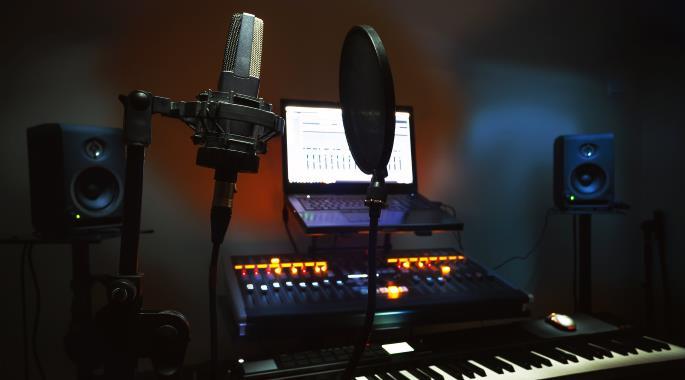
Setting up a studio can be very confusing when you are doing it for the first time without prior information on the same. These tips will make the entire process easy for you, and I guarantee you won’t regret following them through.
- Really, listen. Sound is the most important thing when it comes to a recording studio. If it sounds good, then it probably is good. The quality of the sound/audio is the most important thing, and that is why always listen so you can decide. Relying on a vectorscope or spectrum analyzer is not a bad thing but your ears are the best tools to help you determine whether the sound is good or not. Always rely on your hearing senses to decide on what to get. Listen in mono, quietly, loudly whichever way you can so you can ascertain that it sounds good and that you are happy with it.
- When you are deciding on the setup of your studio, be sure to take your time before you conclude. The reason you need to take your time is so you perfectly decide where specific machines will be set up as you continue making your purchases. If you have all your machines by the time you are doing your set up, then be sure to set up in a way that cables are not in the open to avoid any accidents of people tripping because of the cables. The right set up goes along and that’s why taking your time is important.
- When purchasing studio equipment buy what you need at first as you continue researching where to get equipment that is not super expensive. The reality of studio equipment is that you will get a particular equipment going for different prices in different shops. In one shop it might be super expensive and in another shop, it could be on the lowers side. Doing this will help you save a couple of dollars which if you ask me is a good thing. Research will also help you buy the best equipment you can which will save you money on repairing faulty equipment from time to time.
- Be sure to get the best monitors and headphones that you can possibly afford. Many people end up collecting every headphone and monitor they can because they love collecting tech equipment. We usually redder to this as the gear acquisition syndrome which if you ask me can end up making you spend so much money over tech that won’t assist you in the long run. Make sure you have a balance of being a tech versus a composer or player. You can spend a lot of the time you collect tech to get accustomed to software that you will be used for mixing and what not.
- Make the mixing board a priority: The mixing board is to sound recording as the motherboard is to a computer. This is how important it is and the reason you should invest majorly in it. If you have to have ready replacements the better. Don’t wait until you are overrun with gear to plan for one. Don’t be intimidated by the cost, it can be overcome. The entire spread, the gear, cables, racks, and tables even including the bed can cost less than $1,500. If you plan yourself well and save diligently prior to your purchases, you can do this and do it freely feeling no constraint.
- Research the difference between soundproofing and absorption. These two have different meanings in sound recording. If you do not understand what these two mean, you can get yourself the book “Build It Like The Pros, by Rod Gervais “. This book will give you all the information that will make it easy for you to start a home studio and what equipment you need. This book is very important for anyone who would love to build any kind of studio regardless of how small it is. It will help you understand the vocabulary and terminologies used in recording studios.
- Get your listening right and make your studio look cool. Use absorbers and diffusers to minimize the ‘room sound’. Make sure there are no parallel walls that make standing waves. And my best advice is to make it look cool. All these are integral parts of a studio, and as I said sound is very important. Be sure to make your studio as cool as you can because this will help in bringing out your creative side and will make work enjoyable for you.
- Have a professional help you in setting up your studio. In the place that you set up your studio by yourself, You need to treat the acoustics of your room as best you can. You need to be specific because if you are not; you risk having your studio standards below the required status. This is why you should seek professional help which guarantees you a great outcome.
- It’s better to spend money on acoustic treatment than on fancy speakers: The acoustic quality really makes or breaks your studio. When the acoustics have been set up badly, then you are guaranteed a pathetic outcome and the vice versa is also true. Be sure to spend more of your money investing in a good acoustic set up than anything else you would want to invest in. Do not by any chance assume that you should not invest in other quality equipment. No, this only means that the most important thing which is acoustics should be taken care of first before everything else is considered.
- Do what you love: In anything that you set your mind to do, making sure that you love it is always number one. It is very important to put your all in what you do and the only way this is possible is if it is something you enjoy doing. Money should never be a motivator for you. Be keen on new innovations, invest your time in what will grow your skills and make you a better sound engineer. Be sure to concentrate on your strengths and what you can do better, leave your weaknesses aside. Strive to grow yourself and the quality of your studio.
- Build a powerful desktop PC with a killer sound card first. Then research your favorite artists and see what sort of gear they are using in their studios. Every synth has a different sweet spot, so see what your favorite artists are doing with gear and take their results as recommendations. Buy one piece at a time and learn it front and back. As you invest also be sure to research further on how the equipment will work for you and grow your skills. You can’t be the person who checks what others are doing and think doing the same thing will guarantee you success. The only thing to do is to make sure you research and find out how the same can work for you and better than the other.
- If you make yourself a comfortable place with a few reflections of the sound as possible, then you will hear how your music sounds. The reflection of sound distorts how the original sound, sounds which might be disadvantageous for you. You should try to get a room that has no echos so you can interact with your sound as raw as it comes. The sad thing is that it is impossible to get a room that doesn’t reflect sound so all you have to do is get one that has less sound reflection.
- Don’t work on the acoustics of the room. Leave it as it is, natural unless you really know what you’re doing. It is often better to do nothing than end up with an unbalanced room. Also, check the quality of the electricity supply. You need a good earthing. In older places, this can really be a big problem. If you can’t invest in professional help, then you better leave the room as you find it instead of messing it up further.
- When you have the money, you would want to jump into it and buy all the equipment that you would want. Is better to invest in different equipment a step at a time. This gives you time to know how to use it before you get another one and another one. Buying all the equipment at once will have you overwhelmed on what to learn and which one to put aside for later. It also helps you do your research and know which is the best equipment to invest in.
- You need not know everything to get started. Get started and then learn everything else as you go. If you wait until you know everything to start, chances are you will keep on procrastinating and you will never take a leap of faith and create your studio.
Other Posts

blog
The Auditioning Process, And The Dos And Don’ts
The Auditioning Process In Television and Film When you’re called in for an acting audition, the people present at the audition will include you, the
March 24, 2020
No Comments

blog
Why Voice-Over Actors Will Not Lose To Text To Speech
Document accessibility is one of the more common uses for text-to-speech voice–over. Because TTS is a great tool for producing large amounts of voice audio in a short amount of time. But it’s also
January 19, 2020
No Comments

blog
Reasons Why You Should Transcribe Your Audio And Video
What is Transcription? Transcription is more so a film production process that involves converting audio and video file formats into scripts or text file formats
February 1, 2020
No Comments





